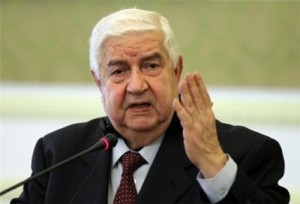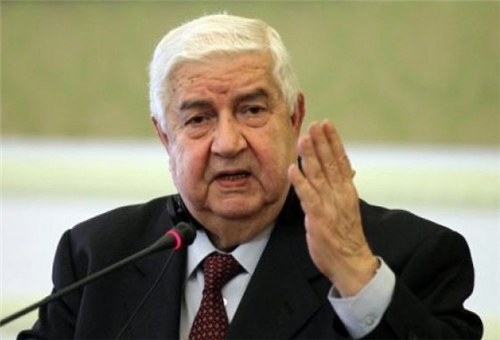 TEHRAN (FNA)- The Syrian government on Monday welcomed a Russian proposal to cede the control of its chemical weapons to international monitors in a bid to prove that it has no plan to use such weapons and, thus, erase the raison d'�tre for the US military strikes.
TEHRAN (FNA)- The Syrian government on Monday welcomed a Russian proposal to cede the control of its chemical weapons to international monitors in a bid to prove that it has no plan to use such weapons and, thus, erase the raison d'�tre for the US military strikes.The statement by Foreign Minister Walid al-Mualem in Moscow offered the first indication that a diplomatic solution may be possible to the international standoff that has evolved since alleged chemical weapons use outside Damascus on August 21.
The attacks brought vows of military action by President Obama, who had previously described the use of such banned weapons as a "red line"; yet, he has, thus far, failed not just on the international scene, but among the United States' NATO allies to build support for unilateral military strikes.
On Monday, while meeting with Mualem, Russian Foreign Minister Sergei Lavrov said his country would ask Syria to relinquish control of its chemical weapons to international monitors in order to prevent a US strike. Lavrov also called on Syria to sign and ratify the Convention on Chemical Weapons, which outlaws the production, stockpiling and use of chemical weapons.
"If the establishment of international control over chemical weapons in that country avoids strikes, we will immediately begin working with Damascus," Lavrov said. "We call on the Syrian leadership not only to agree on a statement of storage of chemical weapons under international supervision, but also to their subsequent destruction."
Mualem said Syria "welcomes the Russian initiative," but did not say whether his country would agree to what Russia was asking. "We also welcome the wisdom of the Russian leadership, which is trying to prevent American aggression against our people," Mualem said.
Hours earlier, in London, Secretary of State John F. Kerry sketched out a similar transfer-of-control scenario, then dismissed it, after being asked by a reporter whether there was anything that Assad could do to avoid an attack. "Sure, he could turn over every bit of his weapons to the international community within the next week, without delay," Kerry said. "But he isn't about to."
But, US State Department Spokeswomen Jennifer Psaki said that Kerry was making a "rhetorical" point in the face of Assad's long-standing intransigence. Psaki said Kerry actually meant that Assad "cannot be trusted to turn over chemical weapons. Otherwise he would have done so long ago. That's why the world faces this moment".
There was no immediate State Department response to the proposal by Russia, or to the response by Syria. Despite the good offer, Obama and Kerry are working hard to win enough support for congressional authorization of a strike.
In an interview Sunday with CBS News, Assad once again denied that his government had used chemical weapons and warned the American people not to get involved in another Middle Eastern war.
The Syrian president said Kerry's effort to generate support for a strike reminded him of the "big lie" told in early 2003 by then-president George W. Bush's secretary of state, Colin L. Powell, in justifying what became the US war in Iraq. Powell based his argument for that war on claims that Iraq was harboring weapons of mass destruction, which later proved false.
In London on Monday, both Kerry and British Foreign Secretary William Hague dismissed the idea that there was "still time" to avoid consequences for what Obama has called a "horrific" chemical weapons attack. "There can't be a negotiated settlement if the Assad regime is allowed to eradicate the moderate opposition," Hague said.
As Kerry continues his Around-The-World-in-80-Days trip, he has so far failed to win international support for a military strike on Syria. During his overseas trip, Kerry appears to have won backing from Saudi Arabia and Qatar for military action against Syria.
On Saturday, the 28-member European Union unanimously opposed a US strike on Syria. The EU said there should be no action against Syria until UN investigators who visited the site of the alleged chemical attack issue their report later this month. The US administration has said the UN report is irrelevant because the investigators' mandate is only to determine whether a chemical weapons attack occurred - which is not in dispute at this point - not who carried it out.
Although the US administration officials have indicated that they have wide allied backing for military intervention, the only other nations to publicly indicate support are Turkey and France, which said last week it wants to wait for the UN report. In Britain, Parliament rejected Prime Minister David Cameron's request for authorization to join the United States in a military strike.
Saudi Arabia and Qatar have been among the leading arms suppliers to the Syrian rebels and have long backed unspecified direct foreign intervention in Syria. Although neither has said whether it would participate in a US-led military strike, Qatari Foreign Minister Al-Attiyah said Sunday that his government was considering how it could be of assistance. Qatar sent bombers and other resources to aid the NATO intervention in Libya in 2011.
Assad, interviewed by Charlie Rose of CBS News in Damascus, said that "it had not been a good experience" for the American people "to get involved in the Middle East in wars and conflicts." He added that "they should communicate to their Congress and to their leadership in Washington not to authorize a strike."
The Syrian president said if the Obama administration had evidence, "they should show that evidence and make their case".
Assad said that his forces "were obviously as prepared as they could be for a strike", and that he was "very, very concerned" that an American attack would tip the military balance of the war in the rebels' favor.
Iraqi Foreign Minister Hoshyar Zebari said in a Baghdad news conference with his Iranian counterpart on Sunday that Iraq "will not be a base for any attack nor will it facilitate any such attack on Syria."
Speaking during his first visit abroad since his appointment last month, Iranian Foreign Minister Mohammad Javad Zarif warned that U.S. intervention in Syria risks igniting a regionwide war.
"Those who are shortsighted and are beating the drums of war are starting a fire that will burn everyone," Zarif said.
By Fars News Agency
The Iran Project is not responsible for the content of quoted articles.











